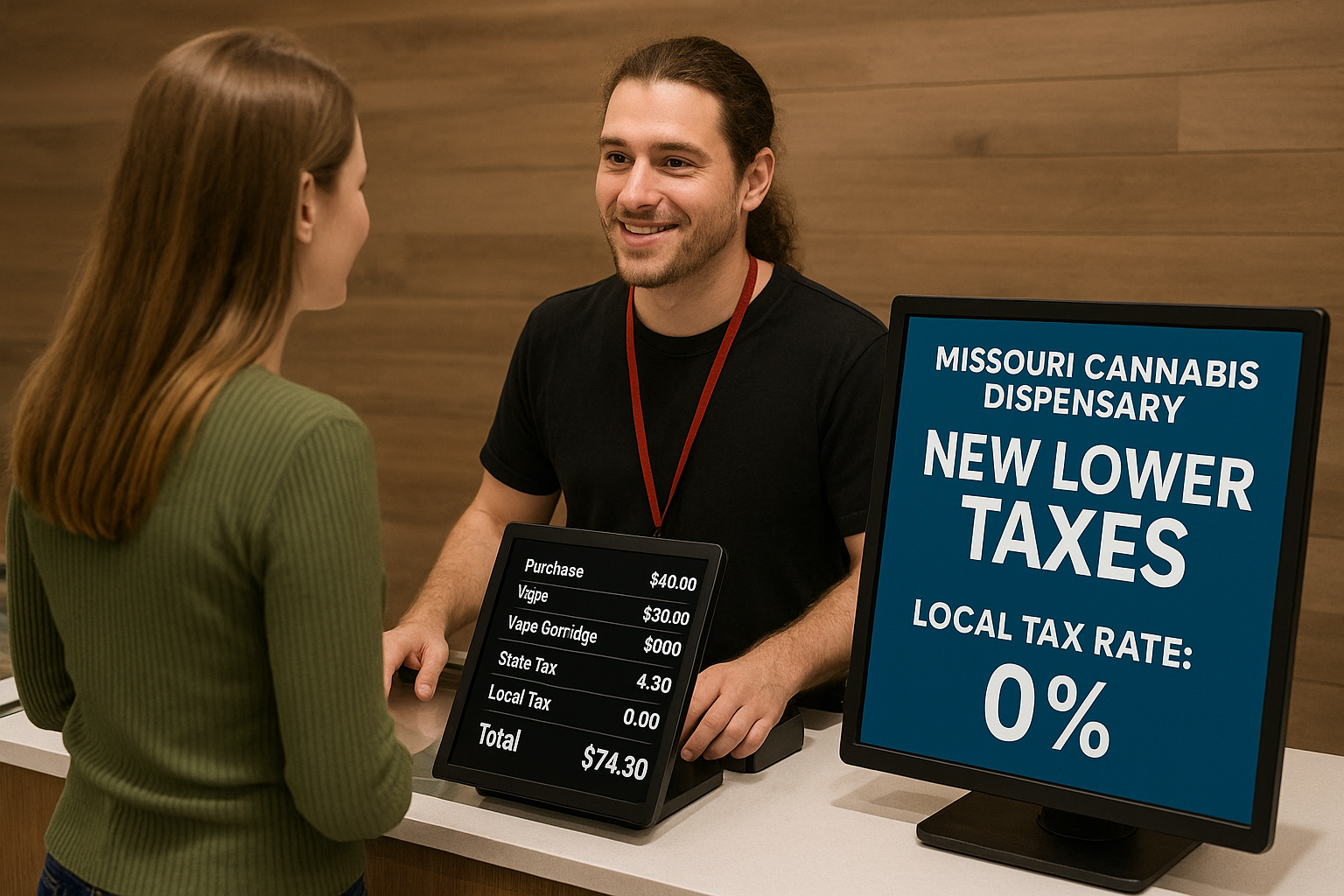Missouri’s Landmark Ruling on Cannabis Tax Stacking
On July 23, 2025, the Missouri Supreme Court delivered a far-reaching decision with immediate consequences for cannabis compliance and pricing in the state. In a 6–1 ruling, the Court held that cities and counties cannot both levy the 3% local marijuana tax within incorporated areas (Axios Kansas City; Missouri Independent). This decision ends years of “double” local taxation and resets how dispensaries, operators, and ultimately consumers will experience Missouri cannabis taxes in 2025 and beyond.
What Just Changed: Missouri Cannabis Taxes 2025
The Pre-Ruling Landscape
Until July 2025, dozens of Missouri jurisdictions in incorporated areas (cities, towns, villages) had enforced both a local city and local county 3% cannabis sales tax on dispensary purchases. This added up to a 6% local tax in select ZIP codes, on top of the state’s 6% retail cannabis tax. Operators and point-of-sale (POS) software had to recognize and apply this double local tax structure based on local boundaries, census blocks, or ZIP codes.
The Supreme Court’s Decision
The July 2025 ruling declared that the Missouri Constitution authorizes ONLY one local jurisdiction to levy a 3% tax on marijuana sales—a city/town/village inside incorporated areas, or a county in unincorporated areas—but not both (Missouri Times; The Beacon News).
- Key takeaway: In incorporated areas, dispensaries now assess a single 3% local tax. In unincorporated areas, only the county’s 3% tax applies.
Quantifying the Impact: Cannabis Pricing in Missouri
Real Price Drop for Consumers
Consumers shopping at dispensaries in affected city/county boundaries will immediately see retail prices drop by up to 3% per transaction. With Missouri’s network of over 200 dispensaries, the shift will benefit patrons in more than 70 localities previously subject to stacked taxes (Missouri Independent).
- Example:
- $100 cannabis purchase (pre-tax):
- Old effective total tax: 6% state + 3% city + 3% county = 12% ($12 total)
- New effective total tax: 6% state + 3% (single local) = 9% ($9 total)
- Savings per $100: $3 (3% reduction)
Over time, especially for frequent buyers, these savings become significant. The ruling will also pressure dispensaries—especially in metro areas previously subject to stacking—to adapt pricing and promotional strategies now that product is more competitive.
Compliance Requirements: How Dispensaries Must Update POS, Tax Logic, and Operations
1. POS and Tax Engine Updates
All Missouri dispensaries must immediately update tax logic in their point-of-sale systems:
- By jurisdiction: POS must assess the correct single 3% local tax, using reliable boundary data (ZIP, census block, local maps).
- Remove dual assessments in any incorporated area (cities, towns, villages). Retain the county 3% only in unincorporated areas.
- Collaborate with POS software vendors: Ensure urgent software patches or overrides are pushed to avoid compliance risk.
- Audit transaction records for possible overcollection since the case was brought—vendors should back-test sales by ZIP and local code.
2. Refunds, Credits, and Consumer Notification
The Court’s decision raises potential liability for refunding or crediting taxes collected under the invalid regime. Dispensaries must:
- Consult the Missouri Department of Revenue for guidance on tax remittance and potential refunds.
- Track and document transactions in affected zones back to the start of the tax stacking challenge.
- Prepare to offer refunds or credits to customers if mandated by the DOR or local officials—communication campaigns and signage may be necessary.
- Operators should monitor https://dor.mo.gov and municipal channels for notices on restitution procedures.
3. Contract and Delivery Implications
Delivery services, MSOs, and wholesale partners must revisit contracts and SOPs:
- Ensure terms reference the new single-local-tax regime in all pricing, revenue share, and transfer agreements.
- Re-calculate tax “pass-throughs” and invoice logic (both B2C and B2B).
- Update settlement and clearinghouse processes for multi-location operators with complex jurisdictional footprints.
4. Internal Training and Documentation
- Train all point-of-sale staff and compliance officers on the new tax protocol.
- Update internal SOPs, compliance manuals, and consumer-facing signage.
Broader Regulatory Impact: Will Other States Reconsider Cannabis Tax Layering?
Missouri has become a national test case for cannabis tax “stacking.” Other legal states, such as California and Michigan, allow layered local taxes on top of state excise and sales tax. The Missouri Supreme Court’s strict reading of its constitutional amendment could inspire similar lawsuits elsewhere—MSO legal teams should carefully analyze each state’s enabling statute or amendment.
Operators should:
- Monitor litigation and regulatory activity in other states with complex local cannabis tax regimes.
- Be prepared to act quickly in the event of domino-effect rulings that would require swift POS/tax engine reconfiguration.
The Missouri Department of Revenue and local enforcement bodies are in the process of issuing updated bulletins and compliance memos. Inaction or delayed POS configuration now presents a measurable risk:
- Penalties and fines may apply if overcollection is detected after the effective date of the Supreme Court ruling.
- Local governments may refer persistent noncompliant dispensaries for state or municipal enforcement action.
- License renewal and review in 2025 and 2026 will likely scrutinize tax compliance audits for this period.
Stay up to date: Visit MODOR Marijuana Tax Information for the latest bulletins.
- Missouri cannabis taxes in 2025 are now capped at 6% state + 3% local (city, OR county, not both).
- Retailers must update POS systems immediately to avoid overcharging—and potential compliance penalties.
- Consumers in incorporated areas will save 3% on all eligible cannabis purchases.
- Dispensaries should watch for Department of Revenue guidance on consumer refunds/credits and related obligations.
For detailed compliance checklists, POS reconfiguration templates, and the latest regulatory updates on Missouri cannabis taxes 2025, trust CannabisRegulations.ai. Stay audit-ready and protect your license—explore our tools and expert resources today.
